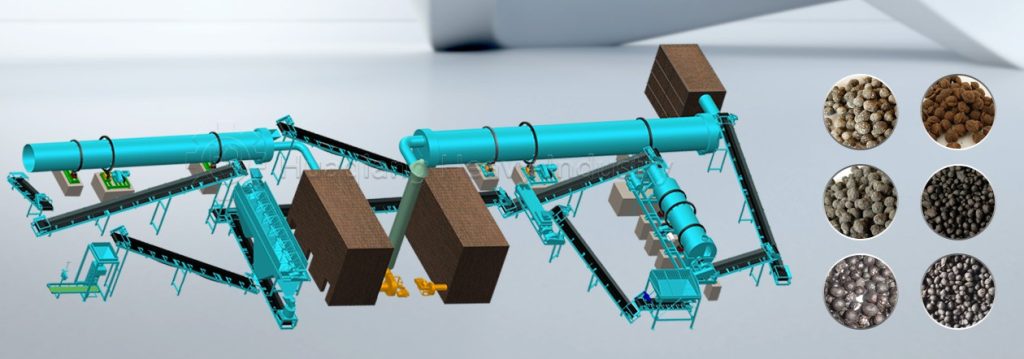Organic Fertilizer: Nature’s Gift and the Future of Agriculture
In the pursuit of sustainable development, organic fertilizer is increasingly valued as a bridge connecting natural cycles with modern agriculture. It is not just a fertilizer, but also a manifestation of nature’s material cycle, making significant contributions to soil health and agricultural sustainability.
Raw Material Sources of Organic Fertilizer: Nature’s Recycling
Organic fertilizer refers to fertilizer derived from plant or animal residues that have been decomposed and transformed by microorganisms. Its raw materials come from various sources, mainly including:
- Agricultural waste:Such as crop straw, rice husks, fruit shells, soybean meal and other plant-based materials, rich in cellulose, hemicellulose and lignin.
- Livestock manure:Including cow dung, pig manure, chicken manure, etc., containing large amounts of organic matter and nutrients like nitrogen, phosphorus, and potassium.
- Food processing by-products:Such as distiller’s grains, soy sauce residue, sugar residue, etc., rich in organic matter and trace elements.
- Urban organic waste:Kitchen waste, garden waste, etc. can also be used as organic fertilizer raw materials after classification and treatment.
- Special organic resources:Such as seaweed, peat, worm castings, etc., containing unique bioactive substances.
(Source: Production and Application Technology of Organic Fertilizer, China Agricultural Press, 2018)
The Unique Value of Organic Fertilizer in the Fertilizer Industry
Compared with chemical fertilizers, organic fertilizer has irreplaceable ecological value and agronomic significance:
- Improves soil structure:Organic fertilizer can increase soil organic matter content, improve soil aggregate structure, and enhance soil water and fertilizer retention capacity. Research shows that long-term application of organic fertilizer can increase soil organic matter content by 20-30%1.
- Provides comprehensive nutrition:Organic fertilizer contains various macroelements and trace elements required by plants, with slow release that reduces nutrient loss.
- Promotes microbial activity:Organic fertilizer provides energy and nutrients for soil microorganisms, helping to establish a healthy soil microbial community.
- Reduces environmental pollution:The use of organic fertilizer can reduce agricultural non-point source pollution and lower the risk of water eutrophication caused by chemical fertilizers.
The Contribution of Organic Fertilizer to the Fertilizer Industry
In the field of fertilizer industry, the production and application of organic fertilizer has brought multiple changes:
- Promotes resource recycling:The organic fertilizer industry transforms organic waste from agriculture, animal husbandry and urban areas into valuable resources, achieving “turning waste into treasure”.
- Drives industrial upgrading:Modern organic fertilizer factories adopt advanced fermentation processes and quality control technologies to improve the quality and standardization of organic fertilizers.
- Meets market demand:With the development of organic agriculture and green food, the market demand for high-quality organic fertilizer continues to grow, providing new growth points for fertilizer companies.
- Promotes technological innovation:The research and development of new products such as bio-organic fertilizers and functional organic fertilizers has promoted innovation in fertilizer technology.
“Organic fertilizer is not simply a return to tradition, but the sublimation of traditional wisdom based on modern technology. It represents the direction of sustainable agricultural development in the future.”— Expert from the Institute of Soil and Fertilizer, Chinese Academy of Agricultural Sciences
Looking to the future, as people pay more attention to food safety and ecological environment, organic fertilizer will play an even more important role in modern agriculture. Fertilizer companies should seize this trend, increase investment in organic fertilizer research and development, and promote the organic fertilizer industry to develop in the direction of high quality, standardization and functionality, making greater contributions to agricultural green development and ecological civilization construction.
1 Zhang et al., “Long-term manure application increases soil organic matter and aggregation”, Soil Science Society of America Journal, 2017
Organic Fertilizer Production Line
Equipment Composition
- Pre-processing equipment:Crushers and screens for breaking down organic waste and removing impurities.
- Fermentation equipment:Composting turntables and fermentation tanks for converting organic waste into stable organic matter while eliminating pathogens.
- Compost turners:For regular turning to provide oxygen and accelerate fermentation.
- Granulation equipment:Disc or drum granulators for forming fermented material into granules.
- Drying equipment:Rotary drum dryers for removing excess moisture.
- Cooling equipment:For cooling granules to prevent quality issues.
- Screening equipment:For ensuring consistent granule size.
- Coating equipment (optional):For moisture-proof coatings.
- Packaging equipment:Automatic packers.
- Control system:PLC systems for monitoring key parameters.
Application Scenarios
Ideal for livestock farm waste treatment, municipal sludge recycling, and green organic farming, especially in facility agriculture, orchards, tea plantations, and high-value cash crop areas[2]. Organic fertilizer improves soil structure and water/nutrient retention, supporting sustainable agriculture.
